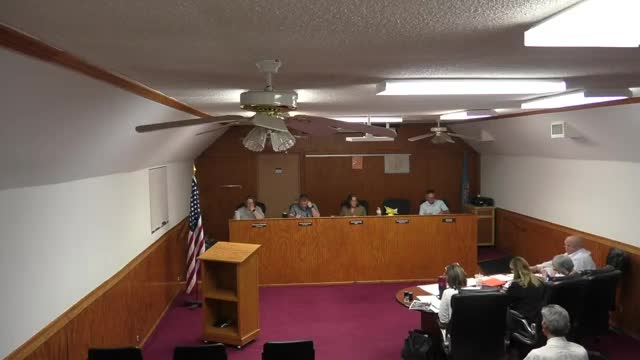Perkins approves five-year capital plan and 10% utility rate increase; rescinds insurance waiver stipend
Get AI-powered insights, summaries, and transcripts
Subscribe
Summary
Commissioners approved the city’s five-year capital improvement plan for fiscal 2026, reviewed the operating budget, approved a 10% increase to water and sewer rates (and a three-year plan to equalize commercial sewer per-gallon charges), and voted to rescind the employee medical insurance waiver stipend effective May 1, 2025.
Perkins commissioners on April 8 approved the city’s five-year capital improvement plan for fiscal 2026, reviewed the operating budget for fiscal 2025–26, approved a 10% increase in water and sewer rates and a plan to phase commercial sewer per-gallon charges to equal residential rates over three years, and voted to rescind the employee medical insurance waiver stipend effective May 1, 2025.
Why it matters: staff described a sustained decline in sales-tax revenue and rising operating costs — including large health-insurance increases and higher utility and chemical costs at water/sewer facilities — that create a budget shortfall. The combination of the 10% rate increase and the proposed utility changes was presented as the measure that balances the utility fund in the staff’s model.
Capital improvement plan and project highlights City staff presented a living five-year CIP that lists planned purchases and projects across departments. Items discussed included a backhoe financed over five years, the sewer jetter (the subject of separate action), a generator for a lift station, root-control programs, required synthetic-organic-chemical testing (staff cited roughly $12,000 for that testing), vehicle purchases and building repairs. Staff gave a total-program figure in the packet and said the list will evolve as revenues and grants change.
Operating-budget context and insurance changes City Manager Bob and staff told commissioners sales tax revenues have trended downward and operating costs have risen; staff proposed no across-the-board employee raises in the presented budget. Health-insurance premiums rose sharply this year, and staff said employees agreed to accept a portion of the increase: "we're asking the employees, and they have agreed to take on, essentially, the 23% raise for health insurance so we can keep what we have," the city manager said on the record.
Commissioners voted to rescind the city’s employee medical-insurance waiver stipend (a $175 monthly payment to employees who show proof of alternate coverage) effective May 1, 2025. Staff said the city’s insurance broker recommended ending the stipend because it creates an appearance of encouraging employees to forgo employer coverage.
Utility-rate change Staff presented rate tables showing customer counts by usage tier and the modeled effect of several percentage increases. The staff recommendation and the motion the commission approved increase water and sewer rates by 10% across the board and add a policy to move commercial sewer per-gallon charges to parity with residential rates over three years. Staff provided an illustrative example: a household using roughly 5,200 gallons would see an increase of about $9.79 on water/sewer and roughly $0.22 on the trash side under the 10% model. Staff said implementation would likely be effective July 1, 2025, to align with billing cycles.
Commissioners and staff discussed cut options and the alternative of using savings to fill the gap; staff said using reserves at the level required to avoid the increase would consume a substantial portion of the city’s savings and could require deeper cuts in service or personnel later.
Votes and next steps The five-year CIP was approved. The commission did not finalize the overall operating budget that night (staff said further review or adoption could occur at the next meeting), but commissioners approved the utility-rate motion, the rescinding of the insurance stipend, and directed staff to bring a resolution reflecting the rate changes back to the next meeting for the formal ordinance/resolution vote and effective dates.
The discussion emphasized that shopping local and attracting business sales tax remain central to the city’s revenue outlook; staff said they will continue pursuing grant funding and other revenue options to reduce pressure on utility ratepayers.
